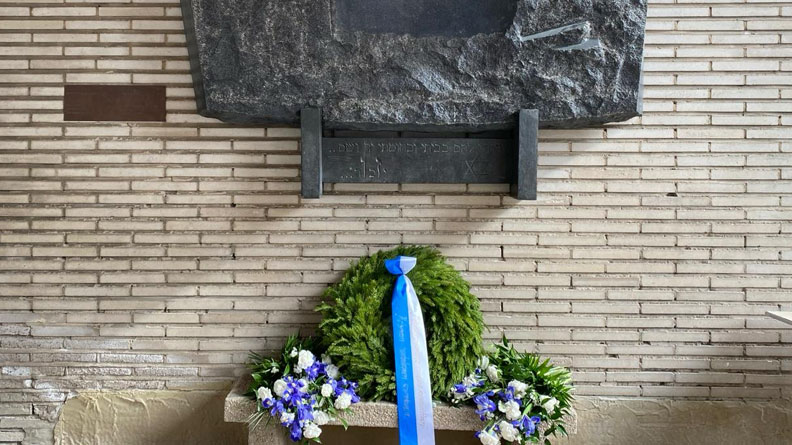Yom Hashoah 5784 / 2024, speech by Yaron Nadbornik, President of the Jewish Community of Helsinki (Finnish and English)
Ambassador of Israel Hagit Ben Yaakov, Rabbi Samuel Beniard, Honored guests, community members, friends, hyvät ystävät, kära vänner,
Olemme kokoontuneet tänne tänä päivänä, muistelemaan ainutlaatuisen synkkiä tapahtumia. Käymme jo yhdeksättä vuosikymmentä holokaustista, mutta edelleen joukossamme on joitakin seurakuntalaisia, jotka omaavat omakohtaista kokemusta noista kauheista hetkistä. Holokaustin mielettömyys ja suuruusluokka antaa epäilijöille aihetta ihmettelyyn, mutta suurimpia ihmettelijöitä olemme me maailman juutalaiset. Tänään, eilen ja tulevaisuudessa. Mihin katosivat kokonaiset suvut, perheet, ystävät, liiketuttavat, lapset, vanhemmat, serkut, ihmiset, joilla oli huolia ja murheita, iloja ja onnistumisia? Ainoa ero holokaustin uhreilla ja meillä elävillä oli onnemme syntyä aikana, jolloin voi työpaikallaan kertoa olevansa juutalainen eikä siitä joudu syrjäytetyksi eikä erotetuksi, poliisi ei tule viemään junamatkalle yön pimeinä tunteina, matka, jonka loppupäätä ja tarkoitusta voi vain arvailla tietämättömänä.
Even though Finnish Jewry was not a victim of the holocaust, we are all too well aware of the eight Jewish refugees sent to their deaths to Germany from Finland by the Finnish Secret Police, Valpo. These were civilians whose only crime was to be Jewish, and who were seeking refuge in Finland, sent to an almost certain death. A shameful event, that was unfortunately, all too common in Second World War Europe. The holocaust, the Shoah, decimated Jewry in Europe then, and Judaism is still on a route to recovery. Figuratively speaking, but also psychologically. Due to the holocaust, world Jewry is still today trying to find answers. The unfortunate truth may be, that there might be no answers to the madness and hatred that drove the Nazis and their henchmen to commit the most terrible crimes. Deeds so unfathomable, our understanding falters even decades after.
Those who experienced the Shoah personally, had and have a strong bond with their Jewish communities. In Europe, US, South-America, Israel, wherever they were located, they were always ready to support the Jewish community around them. The next generations, having been told the stories, not having felt the pain, we do not have a similar bond with Jewry and Israel. We do not understand the meaning of NOT having the state of Israel, how unique and wonderful, practically miraculous its existence is. Looking at some of the pro-Hamas University demonstrations, there were some Jews participating as well, to my disbelief and disgust. This is however a small minority. After October 7th the Jewish world has rarely been as united behind Israel as it is now. In the next generations the meaning of supporting Jewish causes, and the state of Israel might not be as self-evident. Pain that you feel is not the same as pain that you are told of. It is our duty to find the way to keep the connection strong. To tell our children in a way that they understand and feel the extent of the Shoah.
It occurs to me that how we Jews deal with events, good or bad, is not only to commemorate, but also to congregate. When celebrating Pesach we are instructed to exit Egypt again, physically celebrating the joy of our freedom as if we were there personally, for years and years to come. Similarly as we now prepare to soon celebrate Shavuot we are reminded that each and every one of us was present on Mount Sinai to receive the torah from G-d, we were all there. Each and every one of us. Like a marriage, for better or for worse, we were all there. We were all victims of the Shoah. When we were lifted up on Mount Sinai it was all Jews together, and as we today, all over the world, remember how our people were hit very hard we are here to congregate together, to remember and to witness.
As the survivor’s ranks grow thinner, the importance of days such as Jom Hashoa grow in importance. It is our duty to remember, and not only to remember, but to make the Shoa be remembered by others.
Holocaust survivor Elie Wiesel said something remarkable in the opening ceremony of the New Holocaust History Museum in 2005: My good friends – we never try to tell the tale to make people weep. It is too easy. We did not want pity. If we decided to tell the tale – it is because we wanted the world to be a better world – just a better world and learn and remember…

